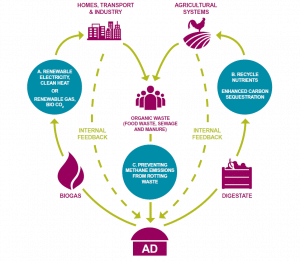Atlas Copco has released a new video demonstrating its latest turnkey containerised oxygen generation system,…
ADBA responds to DESNZ “Powering Up Britain” plans
ADBA responds to DESNZ “Powering Up Britain” plans
The Government today unveiled its ‘Powering Up Britain’ papers setting out the Department for Energy Security and Net Zero’s (DESNZ) approach to delivering energy security and net zero. Biomethane is referenced in the “Enhancing Security of Gas Supply” section of the Energy Security Plan, setting out the steps that DESNZ is taking to make the UK energy system more energy independent, secure and resilient.
Chris Huhne, Chairman of the Anaerobic Digestion and Bioresources Association (ADBA) commented: “At a time when other European governments are boosting biogas as a key part of their policy ,this energy security strategy shows little grasp of the potential of the sector or what is needed to unlock it. At least biogas and biomethane are mentioned – an advance of last April’s energy security strategy – but words are cheap. We need action on planning, regulation, bankability, grid connections and more to give Britain home-grown green gas.
Anaerobic digestion, which generates the biogas, is a mature, readily available technology that can be scaled up far more rapidly than nuclear (1) and also supports the decarbonisation of carbon-intensive industries such as transport and agriculture. Our industry currently produces the equivalent of 42% of the power generated by the current nuclear infrastructure. It has the potential to reduce the UK’s greenhouse gas emissions by 6% by 2030. There’s so much more that AD and biogas can bring to the table when it comes to Powering Up Britain.”
(1) an AD plant can be built within two years
-ENDS-
For further information, contact:
Jocelyne Bia, Senior Communications Consultant
e: Jocelyne.bia@adbioresources.org ; tel: 00 44 (0)20 3176 0592
Notes to editors
- The Anaerobic Digestion and Bioresources Association (ADBA) is the trade association for the UK anaerobic digestion (AD) and biogas industry. ADBA’s vision is to see the full potential of the UK AD industry realised so it can help the UK achieve its emissions targets and other policy goals, creating a truly circular economy. www.adbioresources.org
- About the AD industry
- There are currently 702 AD plants operational in the UK.
The entire industry digests approximately 46 million tonnes of organic material each year – organic material that would otherwise emit greenhouse gas if left untreated in landfill. - An estimated 19.6 TWh of biogas is produced each year by the AD industry – this green gas is either used to generate electricity and heat via a combined heat and power (CHP) unit or upgraded to biomethane and injected directly into the national gas grid. This is enough to heat 1.5 million UK homes.
- The industry currently delivers 1% greenhouse gas savings in the UK every year. Fully deployed, this could be increased to 6%.
- An estimated 4,800 people are currently employed in the AD and biogas industry in the UK.
- Fully deployed, by 2030, the UK AD and biogas industry expected to:
- create 30,000 direct and 30,000 indirect jobs.
- save the UK 27m t of CO2 equivalent = taking 1/3rd of all cars off the road, by 2030.
- heat 4.5-6.4 million UK homes with the 8 billion m3 of biomethane generated.
- There are currently 702 AD plants operational in the UK.
- How AD works
Anaerobic digestion (AD) is the natural breakdown of organic matter when deprived of oxygen in a container called digester. The process produces biogas and a residue called digestate – a stable, nutrient-rich substance used as a biofertiliser which restores soil health.

